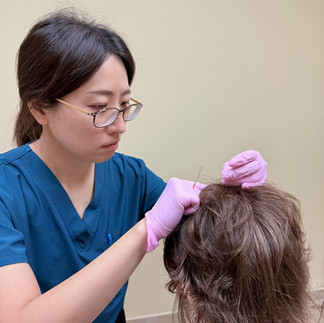Real Patient Stories & Expert Tips: How Acupuncture Helps with Headaches and Migraines
- China Acupuncture Clinic Tyler

- Oct 20, 2025
- 6 min read
If you’ve ever struggled with headaches or migraines, you know how much they can disrupt daily life. At our clinic, we see many patients come in frustrated—either because painkillers only mask the problem or because their symptoms keep coming back no matter what they try.
In this follow-up to our recent article on acupuncture for headaches and migraines, our licensed acupuncturists Erica Wang and Michelle She share patient success stories and practical tips for relief between sessions.
Real Patient Stories: Relief Beyond Painkillers
These are real experiences from our migraine and headache patients:
Monthly hormonal migraines — gone without medication
One patient suffered from migraines before or after every menstrual cycle. After beginning acupuncture, she went through two cycles with no migraines for the first time in years. Her sessions were reduced from weekly to once-a-month maintenance.
Headaches from neck tension & stress
A patient came in with constant pain at the back of her head (occipital headaches). The cause? Tight neck and shoulder muscles from stress. After a treatment series focused on muscle release + e-stim, she reported less pain, better sleep, and higher energy.
Severe migraines — relief without medication
A patient suffered from constant, worsening migraines, where even painkillers didn’t help and head movement caused dizziness. After starting acupuncture with Erica, she felt immediate relief as tension melted away, and learned simple acupressure points to manage headaches at home.
Stories like these highlight how acupuncture goes beyond temporary relief—it helps the body reset and prevent headaches from coming back.
What Therapies Are Used Alongside Acupuncture?
“These therapies help improve muscle relaxation, reduce inflammation, and support long-term progress,” says Michelle.
Electrical stimulation (e-stim): Gentle stimulation on acupuncture needles, often placed around the neck, shoulders, or head, can boost results and provide stronger relief.
Acupressure: At the end of many sessions, Michelle applies gentle pressure to specific points to relax tight muscles, especially for patients with jaw (TMJ) or shoulder tension.
Gua Sha: A scraping technique that helps release muscle tension, improve circulation, and reduce pain or stiffness—especially useful for neck, shoulder, and upper back tension that can trigger headaches.
Heat therapy: Applies gentle warmth to the neck, shoulders, or head to relax tight muscles and improve blood flow from within, helping to relieve tension and reduce headache intensity.
Chinese herbal medicine: Supports internal balance—especially helpful for hormonal migraines, stress headaches, and headaches linked to fatigue, digestion, or blood deficiency.
Moxibustion (moxa): A warming therapy using herbal heat to improve circulation and reduce cold-type headaches or migraines accompanied by neck stiffness.
Cupping therapy (optional): Releases muscle tightness and fascia tension that may restrict blood flow to the head.
Self-Care Tips Between Sessions
While acupuncture does a lot of the heavy lifting, there are simple things patients can do at home to extend the benefits:
Stay hydrated: Dehydration is one of the most common — and most overlooked — headache triggers. Aim for consistent water intake throughout the day, especially after treatments.
💡 Tip: Water is best for staying hydrated, but caffeine-free options like herbal tea are great too. Try Chrysanthemum Tea or Goji Berry Tea. Coffee and sodas don’t count toward hydration and may trigger headaches in some people.
Press acupressure points for quick relief: we show patients how to safely press certain acupuncture points at home when a headache starts. Try:
LI4 (He-gu) – for General headaches and tension
SJ3 (Zhong-zhu) – for Migraine & TMJ (Jaw) relief
GB20 (Feng-chi) – for Neck tension, migraines, stress or sinus headaches
👉 Watch more Acu-point hack videos here: Everyday Wellness Tips: Stretches + Acupoints
Stretch to release neck & shoulder tension: Many headaches start from muscle tightness at the base of the skull. Simple mobility exercises can prevent pressure buildup.
👉 Try this upper back release stretch: Loosen your upper back in 3-min
Support a relaxed body to prevent tension headaches: Use a warm compress or heating pad on your neck and upper back to release tight muscles, take screen breaks using the 20-20-20 rule to reduce eye strain, and keep a consistent sleep schedule to prevent stress-related migraines from building up.
Who’s a Good Candidate for Acupuncture?
In Michelle’s experience, the best candidates are people who want to address the root cause of their headaches—whether that’s muscle tension, hormonal changes, or stress—rather than just cover up the symptoms.
Acupuncture is ideal for people who:
Have recurring headaches or migraines
Feel tightness in neck, shoulders, or jaw (TMJ)
Get hormonal or PMS migraines
Have stress or screen-related tension
Prefer natural, drug-free pain relief
Want long-term prevention, not a quick fix
Are sensitive to medications, including pregnant or nursing women
Each treatment plan is personalized, targeting both the pain and the underlying imbalance that causes it.
💡 If headaches or migraines are interfering with your life, acupuncture may help you find lasting relief.
👉 Book your appointment today and start your journey toward fewer, gentler headaches.
Frequently Asked Questions About Acupuncture for Headaches & Migraines
1. What medicine is usually prescribed for headaches, and how does acupuncture compare?
Over-the-counter painkillers like ibuprofen, acetaminophen, or aspirin are common first-line options for headaches. For migraines, some doctors prescribe triptans or preventative medications. While these may provide temporary relief, many people find the effect wears off or doesn’t address the root cause. Acupuncture takes a different approach—it helps reduce headache frequency and intensity by relaxing muscles, improving blood flow, balancing hormones, and calming the nervous system. Many patients use acupuncture to reduce or even eliminate their dependence on medication.
2. When should I worry about a headache?
Most headaches are not dangerous, but there are certain “red flags” that mean you should see a doctor right away:
Sudden, severe headache (often described as the “worst headache of my life”).
Headaches after a head injury.
Headaches with vision loss, speech changes, confusion, or weakness.
Headaches that worsen with fever, stiff neck, or rash.
If you experience these, seek medical attention promptly. For recurring or tension-type headaches, acupuncture may be a safe and effective option.
3. What causes headaches every day?
Chronic daily headaches can be caused by ongoing stress, muscle tension in the neck/shoulders, eye strain from screens, poor posture, dehydration, or even medication overuse. In women, hormonal changes may also play a role. Acupuncture helps by addressing these underlying causes and teaching patients self-care strategies to break the cycle.
4. Why am I getting headaches every day all of a sudden?
If headaches suddenly become daily, it may be due to new stress, a change in sleep patterns, dehydration, overuse of painkillers, or hormonal fluctuations. Sudden persistent headaches should be evaluated by a healthcare provider to rule out serious conditions. Once cleared, acupuncture can help reduce pain and prevent headaches from becoming chronic.
5. What causes headaches every day in females?
In women, daily headaches often relate to hormonal shifts during the menstrual cycle, perimenopause, or even birth control use. Stress, tension, and lifestyle factors can also worsen symptoms. Acupuncture is well-studied for balancing hormones and relieving menstrual-related migraines, making it a natural choice for women seeking long-term relief.
6. What is a post-traumatic headache, and can acupuncture help?
Post-traumatic headaches often occur after a concussion, whiplash, or head/neck injury. They may feel like tension headaches, migraines, or a constant pressure-type pain. Acupuncture supports healing by improving blood circulation, relaxing tight muscles, and calming the nervous system. Many patients find it helps reduce both pain and the lingering “foggy” feeling that can follow trauma.
7. Does acupuncture really work for migraines?
Yes. Research from Harvard Medical School, Cochrane Reviews, and the American Migraine Foundation shows acupuncture can significantly reduce migraine frequency, intensity, and duration—sometimes as effectively as medication, but without the side effects. In our clinic, we see strong results especially for migraines related to stress, neck tension, TMJ, and hormones.
8. How many acupuncture sessions are needed for migraine relief?
Most people feel some relief within 1–3 sessions, especially if their pain is linked to muscle tension. Michelle explains:
“We usually start with weekly sessions, then space them out as symptoms improve. Many patients move to maintenance care once every 2–4 weeks.”
9. How long does it take for acupuncture to relieve headache pain?
Some patients notice relief during the first session, especially when pain is from tight neck and shoulder muscles. Others experience gradual improvement over several weeks as inflammation reduces and blood flow improves. Consistency is key!
10. Where do acupuncture needles go for headaches?
Point selection depends on the cause of the headache. For example:
Forehead/temple headaches → points on hands + feet to clear tension
Neck tension headaches → points along neck and shoulders
Hormonal migraines → points on lower legs and abdomen for hormone balance
TMJ-related headaches → jaw, face, and shoulder points
Michelle adds:
“Each treatment is totally personalized. Two people with the same headache location may get different acupuncture points combinations because their root causes are different.”
11. Is acupuncture safe for chronic headaches and migraines?
Absolutely — acupuncture is considered very safe when performed by a licensed practitioner. Side effects are rare and mild, like slight soreness or relaxation fatigue. Many people use acupuncture to reduce long-term dependence on pain medication.
Can acupuncture help with hormonal or menstrual migraines?Yes — acupuncture regulates hormones and supports better menstrual cycles. Michelle shares:
“We’ve helped many patients who used to get migraines before or after their period. After regular treatment, their cycle became smoother and migraines went away or became much easier to manage.”




























Comments